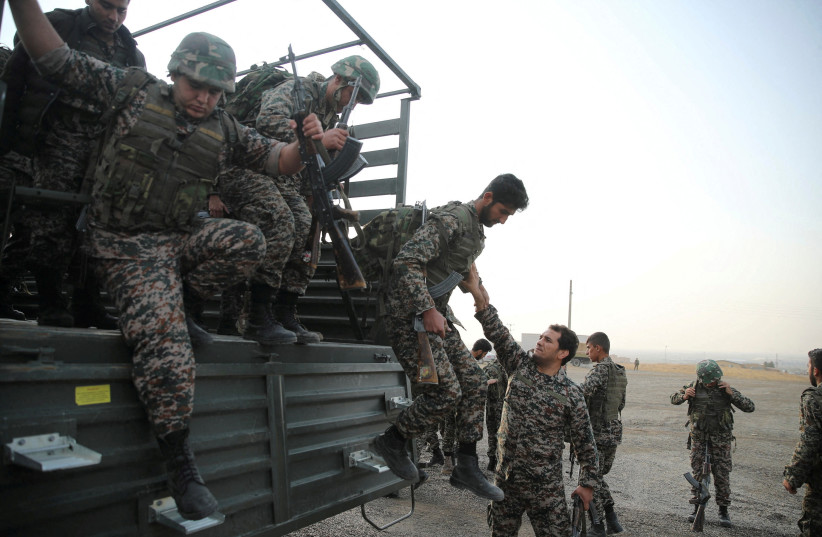At the heart of every US intelligence agency’s mandate, regardless of the president sitting in the White House, lies the unwavering goal of safeguarding the United States’ security and national interests.
However, a critical inquiry into the trajectory of America’s security landscape over the last two decades yields a consensus veering towards deterioration and mounting challenges.
The narrative within all security discourse published by the US invariably features a triad of nations: Russia, China, and Iran.
Unwilling to learn from the lessons of the past
With Iran, the US seemingly reenacts the missteps of 1979, failing to adapt or learn from past follies.
The jeopardy looming over the US and its allies is palpable, raising several questions: Is the threat posed by a rogue regime and the Iranian Revolutionary Guards Corps (IRGC) machinations in the Red Sea unrecognized?

Does the existence of its Quds Force’s terrorist enclaves in Africa go unnoticed?
Is the presence of the Iranian Intelligence Ministry and Quds Force in Latin America undetected?
The US’s reluctance to decisively confront the serpent in Tehran, coupled with a lack of concerted effort, paints a picture of a nation in wait of a miraculous resolution.
Reflecting on the past two decades, one must ponder the extent of detriment the US has endured due to its indecisive stance on the Iranian regime. Since 2003, the headaches spawned by this regime for the US have been manifold. Iran’s years-long strategic infiltrations, ominously extending even to the Antarctic, reveal a calculated ambition to spread its influence far and wide.
In Africa, for instance, the regime has skillfully attracted the disenfranchised, impoverished, and downtrodden, finding no use for the educated and the enlightened. Similarly, within Iran, it is the most destitute members of society who find themselves ensnared as supporters and affiliates of the regime.
The alarm bells ring clear: If the US does not rouse itself from its slumber, the once few hotspots like Hezbollah will, within the next five years, burgeon into 20 volatile hotspots across Africa and the Middle East, with the regime’s overarching mission to undermine the US.
Year after year, the situation deteriorates, leaving US security officials in a perpetual state of lamentation for the past. This downward spiral necessitates a strategic pivot towards regime change in Iran, a move that could potentially outmaneuver Russia and China.
The question then arises: what benefit does the survival of this regime provide to America’s national interest? The answer is unequivocally none. A retrospective glance at the past two decades and a broader overview of the last 45 years reveal a stark misjudgment when the US abandoned the shah of Iran, naively unprepared for the nightmare that radical Islam’s rise to power would unleash.
Today, the insidious spread of this regime’s influence, likened to a cancerous growth, threatens global stability, necessitating decisive and immediate preventive measures.
Moreover, the window to counter Iran’s nuclear advancements narrows with each passing day. A morning may soon dawn when the White House awakens to the reality of a nuclear-armed Iran.
The underestimation of this regime’s capacity for malevolence, coupled with the US’s failure to recognize the impossibility of peaceful coexistence with the mullahs, underscores a critical misstep:
Had the focus been on regime change in Iran rather than military engagements in Afghanistan and Iraq, the global landscape might have been markedly different.
From 2003 to the present, the world has progressively worsened, paralleled by the increasing danger the regime poses. Intent on war and malevolence, the Iranian regime’s understanding of diplomacy, dialogue, peace, and stability is conspicuously absent. This realization dawns anew with each US presidency, each trial of engagement with the mullahs proving to be an exercise in futility and a display of the century’s most egregious naivety.
The collective failure of American policy and assessment concerning Iran, from underestimating the regime’s malevolence to ignoring the pleas of the Iranian people and the testimonies of Iranians and grieving American families, underscores a dire need for a reassessment.
The voices calling for regime change in Tehran, if heeded, could have empowered the Iranian people to conclude their struggle for freedom and democracy. Yet, the inertia of international support has done little to advance democracy in Iran.
The implications of a nuclear-armed Iran loom large, not just as a threat of war but as a testament to the failures of a policy that has allowed misery, poverty, destruction, and ruin to proliferate across regions like Lebanon, Syria, Iraq, and Yemen.
The path forward demands not just recognition of past errors but a committed and strategic engagement to foster change, ensuring a future where the specter of the mullahs’ nuclear ambitions no longer casts a shadow over global peace and security.
The writer is a counterterrorism analyst and Middle East studies researcher based in Washington, with a particular focus on Iran and ethnic conflicts in the region. His new book is The Black Shabbat, published in the US. Follow him on X @EQFARD and at erfanfard.com.
